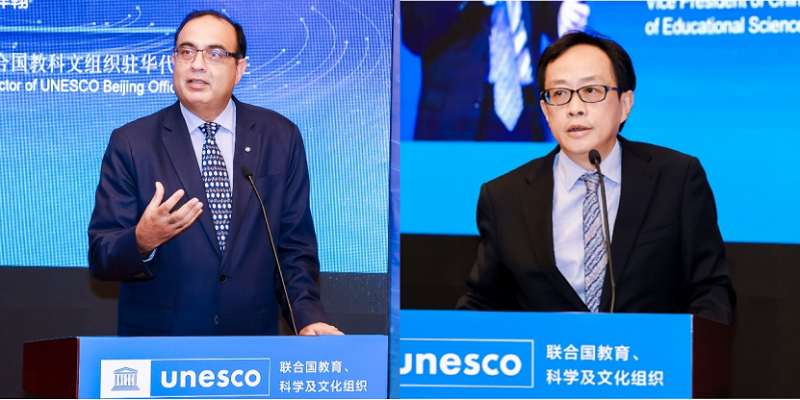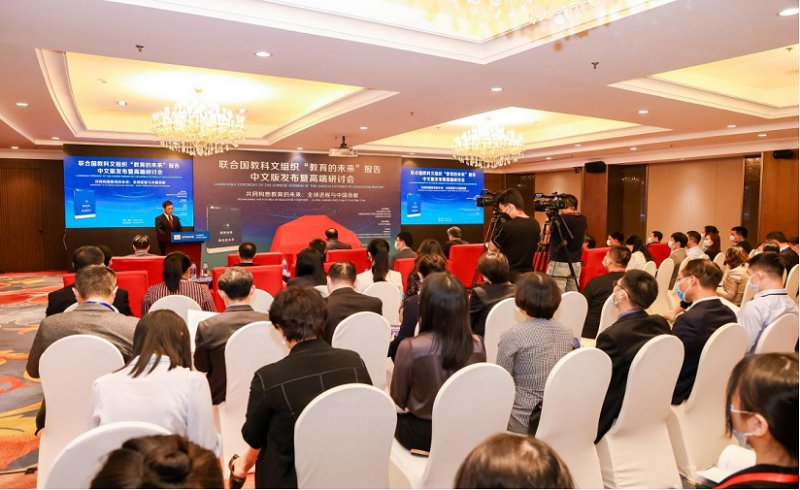
On September 6, the Chinese version of the UNESCO’s Futures of Education report was released and a high-level seminar was held in Beijing. Tian Xuejun, Vice Minister of Education of China and President of the Chinese National Commission for UNESCO, and Stefania Giannini, Assistant Director-General for Education, UNESCO, delivered speeches by video. Qin Changwei, Secretary-General of the Chinese National Commission for UNESCO, moderated the conference.
Tian Xuejun quoted President Xi Jinping’s speech that education inherits the past, shapes the present, and creates the future, which is an important force to promote the progress of human civilization. Chinese government has always placed education in a strategic position and given priority to educational development. The report “Futures of Education” embodies the collective wisdom of global stakeholders, discusses the possible direction of future education development and reshaping education from multiple dimensions, and puts forward action suggestions, which have important reference value for global education reform. Tian Xuejun expected Chinese education researchers and policymakers to carefully study the report, incorporate it into the content of China’s reality, consciously promote international exchanges, and make new contributions to modernizing Chinese education.
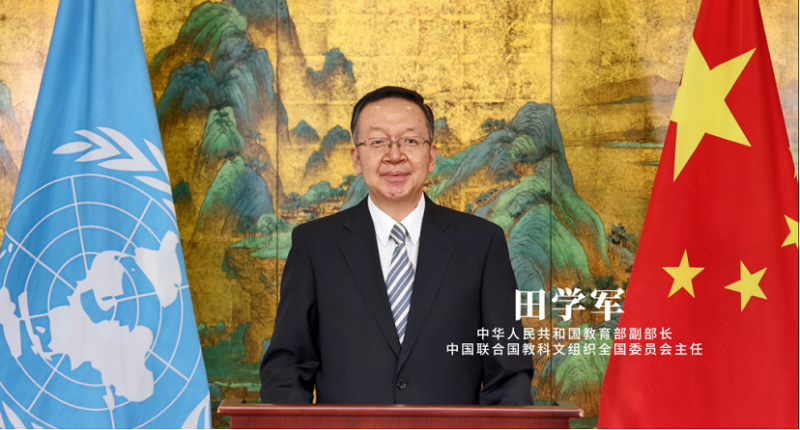
Giannini pointed out that the “Futures of Education” report provided an important reference for the summit on educational reform to be held in New York 10 days later, and its release in Chinese was timely and important. Giannini said that China’s ideas of green education and promoting exchanges and mutual learning through education are highly consistent with the report. China has achieved outstanding and encouraging outcomes in digital education development.
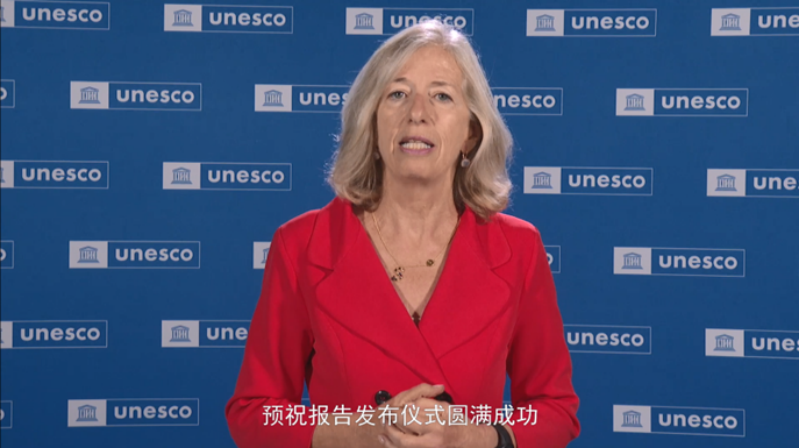
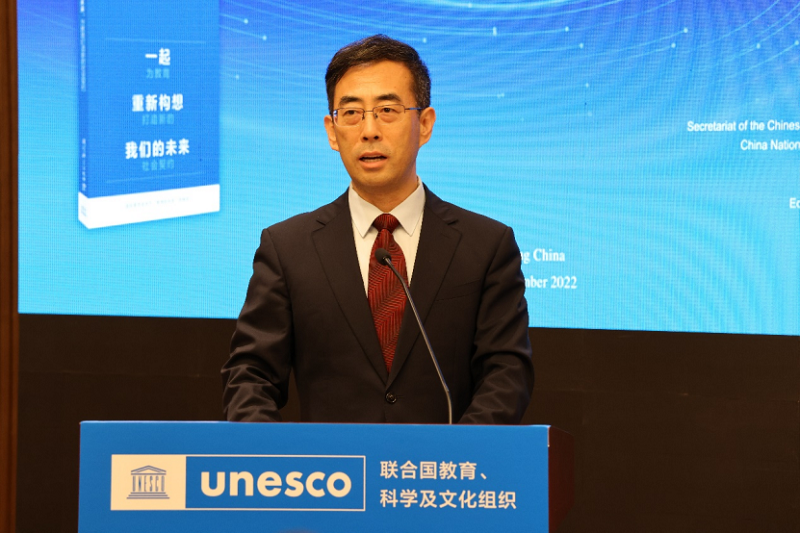
Qin Changwei moderated the conference
In the keynote session, the guest speaker delivered speeches around the theme of “Reimagining the Futures of Education Together: Global Agenda and China’s Contribution”. Sobhi Tawil, Director of the Future of Learning and Innovation Team, UNESCO, pointed out that building a new social contract includes expanding the connotation of the right to education and reaffirming two fundamental principles: education as a public utility and shared responsibility. It is hoped that the dissemination of the report will reach more educators and further stimulate discussion and innovation. Justin Yifu Lin, Member of the International Commission on the Futures of Education, and Professor at Peking University, pointed out that the key to the realization of the United Nations’ 2030 sustainable development goals lies in education. We should recognize and respect the diversity of educational contents, methods, and priorities in different countries. A prosperous human community with a shared future will be achieved through rich and diverse efforts. Cui Baoshi, President of CNAES, shared his thoughts and suggestions on shaping common values, embracing diverse civilizations, and strengthening openness and cooperation. He also expressed his willingness to expand and enrich the global network of educational research and governance under the framework of UNESCO, strengthen multi-participation and exchanges, and expand dialogue and in-depth educational research cooperation.

In the expert discussion session, Gong Ke, Former President of the World Federation of Engineering Organizations (WFEO), Executive Director of the Chinese Institute for New Generation Artificial Intelligence Development Strategies, Zhu Yongxin, Deputy Secretary-General of Chinese People’s Political Consultative Conference (CPPCC) and Vice President of China Association Promoting Democracy (CAPD), Xie Weihe, Senior Professor of Tsinghua University, Zhou Zuoyu, Vice President of Beijing Normal University, Zhang Minxuan, Director of UNESCO Teacher Education Centre (TEC), Xin Tao, Deputy Director of the National Assessment Center of Basic Education Quality of the Ministry of Education, Wang Rong, Director of China Institute for Educational Finance Research, Peking University, and Li Xigui, Principal of Beijing No.1 Experimental School, made exchange speeches from different perspectives around the conference theme. Experts attending the conference agreed that the report “Reimagining Our Futures Together: A New Social Contract for Education” inherited the tradition of UNESCO to publish an important report on education reform every 25 years, and it has enlightenment and reference significance for the future education reform in China. China’s many experiences and practices in promoting educational modernization are highly consistent with the concept of the report, which can provide a useful reference for countries around the world to build a fair and high-quality education system. All countries should base themselves on their own reality and face our common future, and carry out diversified educational reform practice exploration. China is willing to strengthen exchanges and cooperation with other countries in the world, further stimulate the vitality of educational innovation, and work together to achieve the United Nations’ 2030 sustainable development goals.
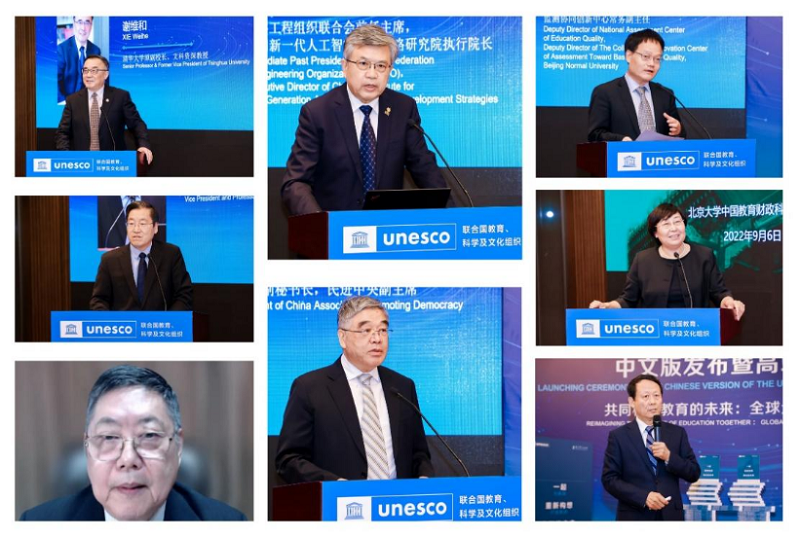
Shahbaz Khan, Director of UNESCO Beijing Office, and Zheng Haojie, President and Editor-in-Chief of Educational Science Publishing House, jointly unveiled the Chinese version of “Reimagining Our Futures Together: A New Social Contract for Education”.
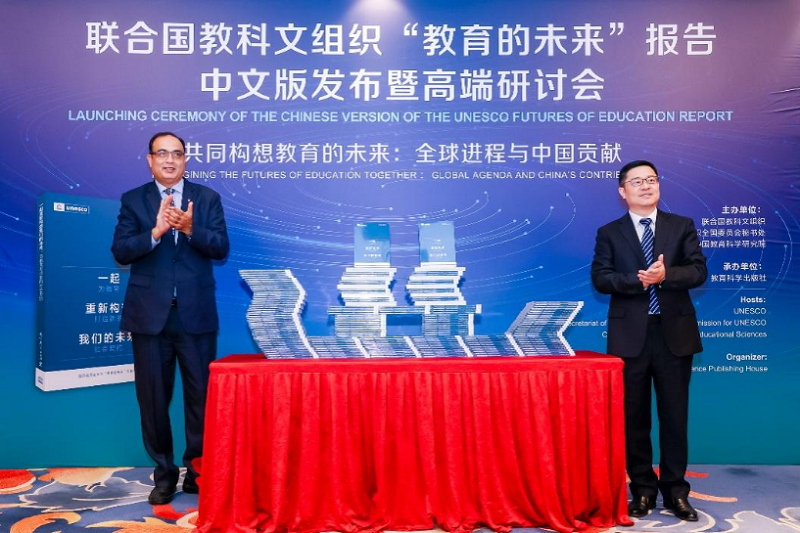
This conference is sponsored by UNESCO, the secretariat of the Chinese National Commission for UNESCO, the China National Academy of Educational Sciences, and organized by the Educational Science Publishing House. It is also an important warm-up activity before the Education Reform Summit. Shahbaz Khan, Director of UNESCO Beijing Office, made a concluding speech, and Wang Ming, Vice President of the China National Academy of Educational Sciences, moderated the expert discussion session.
